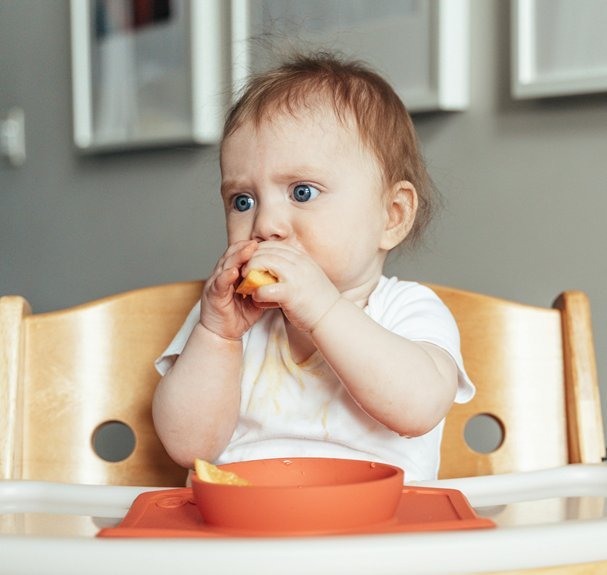When Should You Start Feeding Your Baby Solid Foods?

Knowing when to start feeding your baby solid foods can feel overwhelming. Around six months is typically the right time, but it's essential to look for specific signs that indicate your baby is ready. Look for cues like sitting up with support or showing interest in what you eat. Understanding these signs can help you make the best choices for your little one. What should you consider next as you prepare for this exciting transition?
Signs Your Baby Is Ready for Solid Foods
As your baby approaches six months, you might notice several signs indicating they're ready for solid foods.
First, check if they can sit up with support; this shows they're gaining the strength needed for eating. You might also see them showing interest in your meals, reaching for food, or opening their mouth when you offer a spoon.
Another important sign is their ability to push food to the back of their mouth and swallow, rather than pushing it out with their tongue. Additionally, if they're doubling their birth weight, it's a good indicator.
Recommended First Foods for Your Baby
Once you've determined your baby is ready for solid foods, it's time to explore the best options to start with.
Begin with single-grain cereals, like rice or oatmeal, mixed with breast milk or formula for a smooth texture. Pureed fruits, such as apples, pears, or bananas, are also great choices, offering natural sweetness and essential nutrients.
Vegetables like sweet potatoes, carrots, and peas can be steamed and pureed for a nutritious start. As you introduce new foods, wait a few days between each to monitor for any allergic reactions.
Tips for a Smooth Transition to Solids
Transitioning your baby to solid foods can feel overwhelming, but with a few helpful tips, you can make the process smoother.
Start by introducing one food at a time, allowing your baby to adapt and watch for any allergic reactions. Choose a time when your baby is happy and alert for mealtime.
Make the experience fun by using colorful plates and utensils, and don't rush the process; let your baby explore textures and flavors at their own pace.
Consistency is key, so try to establish a routine around mealtimes.
Lastly, stay patient and supportive, as it might take several tries before your baby accepts new foods. Enjoy this exciting milestone together!
Common Concerns and Considerations
Starting your baby on solid foods can raise various concerns and considerations for parents. You might worry about allergies, so introduce new foods one at a time, waiting a few days to monitor for reactions.
Texture is another factor; start with purees before moving to mashed or chopped foods as your baby gets used to chewing. Remember that some babies may refuse certain foods initially, so patience is key.
Also, consult your pediatrician if you're unsure about the right timing or food choices. Lastly, ensure your baby sits upright during meals to reduce choking risks.
Conclusion
In conclusion, starting your baby on solid foods around six months is an exciting milestone. By watching for signs of readiness and introducing one new food at a time, you can help ensure a safe and enjoyable transition. Remember to choose recommended first foods and address any concerns as they arise. Embrace this journey, and enjoy discovering your baby's preferences as you both explore the world of flavors together!

